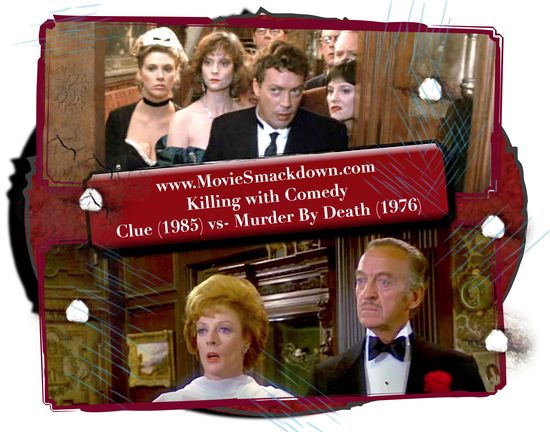
 The Smackdown
The Smackdown
This weekend the theaters are full of fans going back for more of director Martin Scorsese and his muse, Leonardo DiCaprio, in Shutter Island. Scorsese and DiCaprio have worked together in Gangs of New York, The Aviator and, most recently and successfully, The Departed, the mesmerizing tale of undercover cops and organized crime infiltration of the police force.
That last time out for the director/actor duo, their film took home four Oscar statuettes — including ones for Best Director, Best Picture, and Best-Adapted Screenplay. Adapted from what you may ask? From another movie. Departed came to American screens after Hollywood started buzzing about the 2002 hit Hong Kong film Infernal Affairs. Affairs is no stranger to awards though, as it claimed seven Hong Kong Film Awards of its own — including ones for Best Actor (Tony Leung), Best Director, Best Screenplay, and Best Picture. Even though both films were clever enough to win the major “Best Picture” prize in their respective country of release, a probing question remains — did the The Departed team produce a better overall film than Infernal Affairs?
The Challenger
Departed centers on an undercover Boston police officer, Billy Costigan (Leonardo DiCaprio), who infiltrates the underground world of Irish mobster Frank Costello (Jack Nicholson) in an attempt to bring him down once and for all. The Boston police department has a similar infestation problem because one of their treasured own, Colin Sullivan (Matt Damon), is actually a mole for Costello. The real fun begins when each side discovers that they have a mole in their inner circle and they scramble to find out who it is. The story is finally resolved in a dramatic rooftop scene where both moles confront each other in a final standoff laden with inventive twists and a fair amount of bloodshed.
The Defending Champion
Affairs features Tony Leung as Yan, an undercover cop who infiltrates the Chinese mafia, and Andy Lau as Inspector Ming, a Chinese Mafia abettor who imbeds himself in the police force. The thrill ride begins when both moles try to crack the other’s identity while maintaining their own cover. Hmmm… sounds familiar, huh? Topping off this all-star cast, another Hong Kong powerhouse, Eric Tsang plays the rotund Mafia boss and Anthony Wong echoes in as the sympathetic police superintendent.
The Scorecard
Although Departed borrows the bulk of its plot from its Chinese counterpart, it does weigh in with some useful fresh content of its own. Departed does an excellent job of filling in some of the missing story elements of Affairs. Scorsese’s film offers a more thorough look at the evolution of DiCaprio’s character as he grows into the Costello mob family. Departed does the same for Damon’s character showing his quick rise through the police department despite ruffling a few feathers along the way, most notably those of fellow officer Dignam (Mark Wahlberg) — a character not present in Affairs and used effectively for comic relief and exposition in Departed. In true Hollywood fashion, Departed also throws both moles into a love triangle creating more fodder for conflict. The mob boss character was also made an FBI informant in Departed, a motivating detail not referenced in Affairs.
Though these additions to Departed did fill out the story more, some important elements from Affairs were curiously removed — such as as the scene where the police crew and the Mafia crew are sitting in the interrogation room immediately after they have just learned that each has a mole. As the Mafia boss and the police superintendent scan the room trying to get a clue as to who the mole might be, the scene effortlessly shifts from comical to tense all the while illustrating to the audience how faceless and destructive these moles actually are — creating more of a sense of urgency to uncover their indentities. Additionally, in the final scene in Affairs, the only person that knows the true identity of the undercover cop is Lau, the other mole. This minor detail makes the circumstances that much greater for both characters during the climatic rooftop scene. In Departed, we know that the Wahlberg character is still running around somewhere with this insider knowledge, making the desperate rooftop scene a little less…well, desperate.
Was the Scorsese, DiCaprio, Damon combo enough to make an already great movie even better? Or did it only seem Oscar-worthy because Americans hate sub-titles?
The Decision
First, I do have to give credit to The Departed for only borrowing about ninety percent of the Infernal Affairs storyline and trying to pump up the remainder. However, the additional pumping added about fifty minutes to the run time of the film causing it to lull in spots. Affairs ran at a taut 101 minutes and was still able to build a much stronger connection between Lau and Leung’s characters and the audience. Even though all actors in both films delivered superb performances, Lau sold his anguish and his struggle between the good side and the bad side better than Damon. This was important because it left the audience feeling for both characters during the crucial standoff and made the stakes higher for our heroes.
The elements unique to The Departed did give the story a more “complete” feel, but the elements unique to Infernal Affairs gave the story more heart and depth. Explicitly showing everything in a film does not necessarily make it a better film. Sometimes audiences like to use more than just their eyes. Though both are excellent films in their own right, Infernal Affairs is my choice… by a hair.




Scorcese is at his best and truly deserves Oscar for this film. Also notable are the performances of Matt Damon (such a great “bad-guy;” he really must do stuff like this more often), Leo DiCaprio, Jack Nicholson (as always), and Mark Wahlberg (best since Rockstar). However, some in the theater with me who had seen Infernal Affairs did say that Departed did not live up to the original.
Romance in Infernal Affairs: The women were a crucial part of it. I’ll agree that the psychiatrist wasn’t so important, but the gang mole’s wife and the undercover cop’s ex (with whom he had a child!) showed the real difference between their lives. The good guy was alone, he couldn’t be in a relationship, he didn’t get to be the father he should have been. The bad guy got a loving wife, a nice apartment, real comfort. Life’s serendipity isn’t consistent with notions of justice – in fact, the just path is a lot more difficult. Cutting all the ties into a convenient love triangle is nothing more Hollywood’s pandering to prepubescent audiences, keeping them unconcerned with meaningful relationships or hard consequences.
First of all, I would like to say that both are excellent films. They are both personal favorites of mine.
You are completely right. The Departed has a far superior love triangle. The two female characters presented in Infernal Affairs are completely irrelevant and are no more than distractions every time they come on screen. Not to mention Yan’s ex-girlfriend, who is even more irrelevant and superficial. The drama presented in the Departed presents a much more interesting and intriguing background love story.
As for the Infernal Affairs sequels, I believe that they should not be part of this discussion. In fact, they shouldn’t have been made in the first place. Infernal Affairs 2 and 3 were just films the producers made to utilize the hot name of Infernal Affairs 1 and make more money. I mean, there was never meant to be a sequel – the original ended with 90% of the main characters dead, for crying out loud. So for these reasons, I would like to leave them out of the debate.
I love the depiction of the Boston culture. Every small part in the Departed adds to it, and it creates a brilliant back drop for the drama. Although I agree that there is culture represented in Infernal Affairs, it doesn’t come close to matching Boston in the Departed.
However, with respect to the development of the story, the OTHER characters and the plot it self, I must vouch for Infernal Affairs. The fact that only one person in the entire world knew about Yan’s identity makes it so much more dramatic when superintendent Wong dies. Dignam does have his benefits, but in the whole, I think he was unnecessary. The transformation of Ming is also much better portrayed in Infernal Affairs. At the end of the movie, Ming is completely intent on returning Yan’s identity, which adds so much more dramatic irony to the final scenes of the film.
In conclusion, both the Departed and Infernal Affairs are just amazing films. The details are much better presented in the Departed, while the main plot and characters are better in Infernal Affairs. Well, if I must make a decision about which ones better, I’m afraid I must go with Infernal Affairs. It’s got it where it counts – the acting, plot, characters, ending is just a tad bit better. Not to mention the fact that 90% of the Departed’s story was taken directly out of Infernal Affairs. But hey, that’s just my two cents.
you are spot on! she probably ruined the movie for alot of other characters. I simply think scorsese can polish any movie up.
Infernal Affairs is the best and clever story and they were there first. They are much better than The Departed (Copy Cat).
Joe Sullivan (Ireland)
Thanks for picking up on a lot of the details of what makes The Departed unique in comparison to Infernal Affairs. I feel that a lot of other reviewers missed a lot of these.
I prefer The Departed over the entire Infernal Affairs trilogy, and here’s why:
First of all, Ming’s Mary in Infernal Affairs 1 is an extremely annoying character. She’s an author who, shock upon shock, is writing a story about a character who cannot decide whether or not he’s a good guy! This is agonizingly self-reflexive, as Ming listens to her story, ponders his own nature (“I want to be a good guy!”) and she remains oblivious to his connections to the Triads throughout most of the first film.
I prefer the love triangle of The Departed to the side story-esque love stories of Yan and Ming in the Infernal Affairs trilogy. The love story between Yan and the psychologist adds absolutely nothing to the plot of Infernal Affairs 1 OR 3! She plays no role in the struggle between the police and the Triads. As soon as she comes on screen, you can expect loud and especially cheesy romantic music, bad acting from Kelly Chen, and a whole lot of smirking from Tony Leung. They may as well have put a big flashing “love subplot” overtitle onto each one of these scenes. In Infernal Affairs 3, this subplot is even more excruciatingly bad than in 1, as the character is brought in to expand upon a relationship that didn’t amount to much in the first place!
Furthermore, what I find ironic about the gripes of Infernal Affairs trilogy fans in regards to the love triangle of The Departed, is that in Infernal Affairs 3, the psychologist character eventually becomes the same type of link between the two moles! I’m presuming neither of them had sex with her, but both of them obviously had feelings for her and she had feelings for the both of them as well (if this isn’t true in regards to Ming, I have a hard time understanding why she and Ming were spending so much time together in 3). In her heart of hearts though, she ultimately chooses Yan over Ming; especially after learning the truth about Ming (similar to how the psychologist chose Leo over Damon in The Departed).
The psychologist character in The Departed and her connected subplot condenses the love stories of the Infernal Affairs trilogy into a much more tense and complete whole. Her connection to Damon showcases both the charm he uses to advance himself in the police force and the coldness and meanness he exudes as a mole and person in general (here, the personal life legitimately builds and expands on the public life of the characters). The psychologist’s connection to Leo showcases not only just how scarred this guy is on the inside but also shows us why he is truly worthy of being the hero of the story.
Aside from all of this male-dominated discussion in what the psychologist DOES FOR the male characters in The Departed, her affair with Leo actually gives HER character some direction, we can root for HER, she does stuff, she has a STORY, and this is what makes it great for her to find love she’s been looking for with Leo and give the “he’s the mole!” moment of truth some impact. The only compelling female character you can find in the Infernal Affairs trilogy is the Mary of Infernal Affairs 2. All other female characters do nothing but react to the male characters.
To conclude this talk of love subplots and female characters, and their relationships with male characters, Infernal Affairs 1 and 3 offer up Ming sleeping on the psychologist’s couch and then starring, dreamy-eyed at her, thinking about what could be if he ever ended his stint as a mole, as the peak of romance. Ming and the psychologist never “do the deed.” I don’t think they even ever kiss! This is sweet, pure and sad. However, if you compare this to the passionate “we shouldn’t be doing this” type of sex between a mutually desperate Leo and the psychologist in The Departed, you’ll find another reason why I choose the love triangle of The Departed over the relationships of the Infernal Affairs trilogy any day!
I prefer Damon’s take on the mole as someone who is completely sure in what he’s doing (unlike Lau’s turn in the Infernal Affairs trilogy as a conflicted villain/hero). Damon’s a bad guy, he knows it, and we know it. To see Damon subvert his hero persona created in other films is refreshing and actually makes for a more gritty and real movie in my mind. I’m given enough reason to care about the Leo/Damon stand-off because even if Damon is a villain, he’s a charming villain, one who brings you into his world, and I’m interested in what power-plays this character could have made with Nicholson out of the picture and his “hero” status in the police force still intact.
Some people argue that Wahlberg’s Dignam was a completely unnecessary character, I beg to differ. In Infernal Affairs 2 and 3 there are characters who are incredibly similar to Dignam in their relationships to the other characters and the roles they ultimately play in the story: Superintendent Luk, Superintendent Yeung, and “Shadow” Shen. Once again, The Departed succeeds by condensing multiple characters into one to provide a tighter and more logical story. Also, what the reviewer mentioned here is also key to the unique success of the inclusion of Dignam: Walhberg provided great comic relief as the foul-mouthed hot-head of The Departed. This kind of laugh-out-loud humor is missing from the entirety of the Infernal Affairs series.
While many complain about the “Hollywood ending” of The Departed, they fail to compare it to the eventual discovery of the Ming character as the mole (and what may-as-well-have-been his death!) in Infernal Affairs 3. It’s hard to imagine anything more anti-climactic and completely unsatisfying. I couldn’t have cared less whether or not Ming died as he entered his final stand-off with Yeung and Shen. In contrast, the shocking exposition of violence and retribution for the murders of Leo and Sheen, achieved by the quick execution of Damon by Wahlberg in The Departed, brings about a completely satisfying sense of closure.
Were I to omit Infernal Affairs 3 from this judgment of endings, and instead chose to focus solely on Infernal Affairs 1, I would be left with Ming’s survival and what seems to be his decision to begin himself anew as an honest cop. However, this still doesn’t add up to the glory that is Damon’s execution. It could be that I’m just a violence-obsessed guy, or perhaps Infernal Affairs 1 failed to convince me that turning a new leaf was genuine a possibility for the mole.
Another success of The Departed that I would like to mention here is the fantastic job Scorcese does of delving into Boston, and Boston-Irish culture, especially. People accuse this film of simply being “Infernal Affairs… with White People” but that hardly does this aspect of the film justice. If you pay attention to some gems of lines from Nicholson, Damon and others about their identitiy as Boston-Irish, and how they constantly come into conflicts, both big and small, with characters who are NOT Boston-Irish, you’ll see that this isn’t just the background of the film or just an excuse for actors to put on an accent, but it is an integral part of the film itself and its message.
Make no mistake, the Infernal Affairs trilogy clearly is a series of films that deals with the particularities of culture as well: there are telling interactions with people from Thailand, numerous references to Buddhism, a distrust of “mainlanders” from China, and perhaps most importantly, the changing from British colonial rule to “one nation, two systems” with China that serves as the backdrop for Infernal Affairs 2.
However, it is my contention that The Departed surpassess the Infernal Affairs series in being a movie just as much about the ethnicity of its characters, the culture of it’s specific location and its time period(s), as it is about two moles who hunt each other down and the lives they affect along the way.
So, to review:
Romance – The Departed
Mole vs. Mole – The Departed
Justice/Revenge, The End, “What goes around, comes around!” – The Departed
Location, Location, Location! – The Departed
Also:
Honorary Mentions:
Tight Pacing and Suspense – Infernal Affairs 1
Michael Corleone-like character – Infernal Affairs 2, Ngai
One-Way Love Story – Infernal Affairs 2, Young Ming’s infatuation with Mary
I never watch internal affair, but this is very interesting. I love to watch the departed. Can’t wait to watch it.
This minor detail makes the circumstances that much greater for both characters during the climatic rooftop scene.
I remember thinking when I saw “The Departed” that it was a typical American blockbuster. Big actors, lots of action, and plotted to perfection (but all in service to the high concept). Of course, I learned about “Infernal Affaris” and, now, thanks to your review, that’s going to have to move up on the Netflix queue.